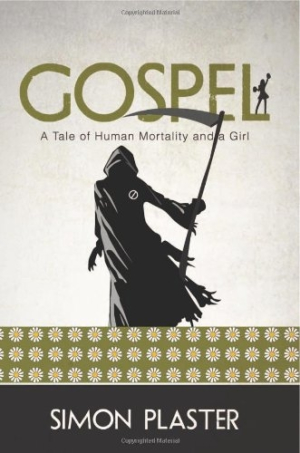GOSPEL
A Tale of Human Mortality and a Girl
In his fourth and final satirical novel starring intrepid reporter Henryetta Hebert, journalist for The Weekly Herald in Henryetta, Oklahoma, Simon Plaster skewers many things people may take as gospel.
Subjects parodied include fire-and-brimstone Christianity, yoga, survivalist movements, the military, Oprah Winfrey, and people convinced the world will end. Plaster makes it his mission to ridicule each of these groups and persons, showing with his trademark over-the-top humor what happens when they get taken too seriously. Gospel: A Tale of Human Mortality and a Girl maintains that one can even laugh at death. When no citizen of Henryetta perishes for a few weeks, the heroine desires to get to the bottom of this glorious phenomenon in the wake of the Herald’s pledge to report positive news.
Henryetta remains appealing and endearing as the young reporter caught in the middle as she tries to figure out how everything connects. Hilarity ensues as she attempts to portray negative things in a positive way; for example, she tries to make a vicious dog sound heroic when he bites someone yet again. Her sleuthing abilities and earnestness make readers like her because she’s just as confused as the audience but stays smart and plucky throughout the novel.
Henryetta’s family and love interest lend her support. Mother Wynona Sue may be addicted to pills and go through boyfriends like socks, but she and Henryetta clearly adore one another and live together in harmony. This is rare in an age in which many books depict acrimonious relationships between parents and their children who have not yet left home.
Jeffrey, Henryetta’s DEA-agent beau, sadly appears too little in the novel, and the author develops his relationship with Henryetta mostly through summary. Nonetheless, their rapport elicits chuckles because of the contrast between the protagonist’s folksy vernacular and Jeffrey’s proper English. They are able to understand each other, however, and romance blooms.
Plaster does an admirable job of making all his outlandish plot threads and players interact in ways that don’t seem too ludicrous. He deftly walks the line between funny and annoyingly absurd. An eye-catching cover—a silhouette of the Grim Reaper with a “forbidden” sign on his chest—assures the audience they have a droll reading experience ahead. And Plaster delivers, playing up the multiple nuances and meanings of the word “gospel” all through the narrative.
Minor things keep Gospel from being wholly satisfying. Ol’ Sarge’s occasional use of profane phrases and words don’t jibe with the otherwise down-home euphemism-laden speech present in most of the novel. Similarly, the descriptors “limp-wristed” and “Chinaman” come across as homophobic and racist, not funny. Thankfully, these offensive moments are few.
Sometimes, Plaster’s approximation of a character’s speech is confusing, as when “[Henryetta] pert near swooned” is meant to be read as pretty near, meaning “almost.” (In other words, the protagonist almost fainted.) These missteps will be easily buried under the author’s spot-on, razor-sharp satire.
Reviewed by
Jill Allen
Disclosure: This article is not an endorsement, but a review. The publisher of this book provided free copies of the book and paid a small fee to have their book reviewed by a professional reviewer. Foreword Reviews and Clarion Reviews make no guarantee that the publisher will receive a positive review. Foreword Magazine, Inc. is disclosing this in accordance with the Federal Trade Commission’s 16 CFR, Part 255.

